Has Kevin McCarthy Won the Vote for House Speaker Yet?
Click through for a special surprise.
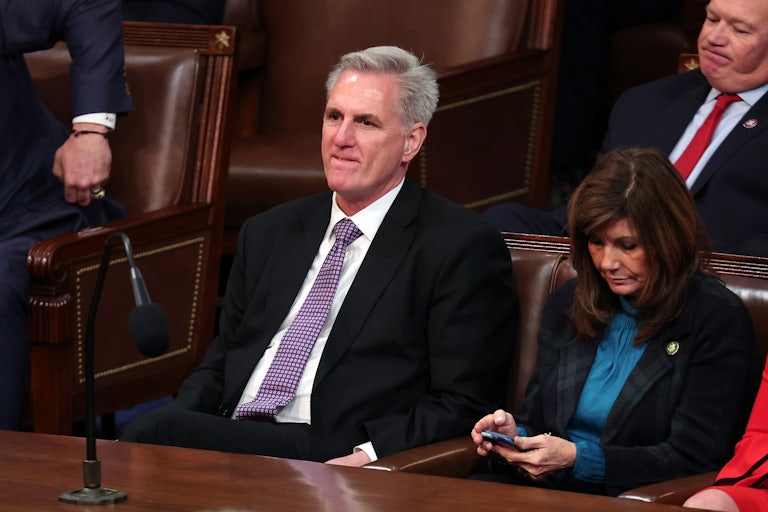
No.
This post has been updated.

No.
This post has been updated.

CVS and Walgreens, two of the biggest U.S. pharmacy chains, say they plan to offer abortion pills after a rule change this week from the Food and Drug Administration.
The FDA announced Tuesday that it would allow retail pharmacies to dispense mifepristone, one of the medications used to induce abortions, for the first time in the United States. Unfortunately, pharmacies in states that have banned abortion since the Supreme Court rolled back the nationwide right to the procedure will not be able to sell the drug.
Pharmacies must first apply for certification from one of the two companies that makes mifepristone. Once they are certified, pharmacists can dispense the drug to anyone who has a prescription.
CVS and Walgreens said Wednesday they were both seeking certification, although they did not specify when they would be able to start dispensing mifepristone. Rite Aid said it was looking into FDA action.
Many reproductive health care experts noted, though, that the FDA rule change is not as big a win as it is being marketed.
Greer Donley, a professor at the University of Pittsburgh School of Law, pointed out that the certification process is complicated enough that it could turn some pharmacies off. What’s more, there are still multiple barriers to accessing abortion pills, which are highly regulated.
"The FDA is allowing retail pharmacies to dispense abortion pills. YAY." This take misses that the rule preventing it was always wrong, and the FDA is still forcing pharmacies to jump through admin hoops not required for other drugs--hoops that will stop pharmacies from doing it.
— Greer Donley (@GreerDonley) January 4, 2023
Hayley McMahon, a reproductive health researcher, said that while it’s “significant” that the pharmacy chains have committed to seeking certification, it remains to be seen how much the new FDA rule will affect abortion access.
“This is a step in the right direction, but I do want people to understand that pharmacy certification is still a blatantly unnecessary restriction that is not supported by evidence,” she told The New Republic, referring to the FDA’s decision to continue classifying mifepristone as a high-risk drug, despite no data backing that up.
The second drug needed to complete a medication abortion, misoprostol, is not restricted under the FDA’s high-risk regulation and is already available at retail pharmacies. Anyone prescribed abortion pills will be able to get both medications at any pharmacy certified to dispense mifepristone.
Abortion pills are seen as a key resource in the fight for reproductive rights because they are easier to access than surgical abortions.
Medication abortion currently accounts for more than half of all abortions in the United States, according to the Guttmacher Institute. The pills were already available at reproductive health clinics, from medical care providers, and from mail-order pharmacies. In the two months immediately following the Supreme Court decision, there was also a surge of orders for abortion pills from overseas.
This post has been updated.

On Thursday morning, Michigan Senator Debbie Stabenow announced that she will not seek reelection in 2024. “Inspired by a new generation of leaders, I have decided to pass the torch in the U.S. Senate,” Stabenow said in a statement.
While many congressional announcements can feel full of filler materials, statements like these warrant closer attention at every line. And as Democrats will now have to protect yet another seat in an exceedingly difficult Senate map, the question of who may earn the bid to do so is already buzzing.
In 2024, Senate Democrats will be defending seats in these swing and red states:
— Grace Segers (@Grace_Segers) January 5, 2023
Arizona
Michigan
Minnesota
Montana
Nevada
Ohio
Pennsylvania
West Virginia
Wisconsin
Stabenow highlighted how she was the first woman from Michigan elected to the Senate, among other milestones. But, Stabenow continued, “I have always believed it’s not enough to be the ‘first’ unless there is a ‘second’ and a ‘third.’” This may give a clue as to who Stabenow may support among an already wide potential field of candidates.
Governor Gretchen Whitmer led a commanding reelection in November, on the same scale that led the media to fawn over Florida’s Ron DeSantis. Such a performance may be an antecedent to a presidential run, but Biden’s future decision, among other things, could readily skew that calculus. If so, a Whitmer bid for the Senate (especially one blessed by Stabenow) would be formidable.
Former Representative Andy Levin could also lead a strong candidacy. Levin, who is Jewish, was a target of inordinate spending from AIPAC—which has funded scores of conservative and election-denying candidates—in his primary loss to Haley Stevens in 2022. Previously endorsed by Senators Bernie Sanders and Elizabeth Warren, J Street, and an array of unions, Levin offers progressives a unifying vessel to rally behind in a state hospitable for a strong Democratic performance.
Other rising Democratic stars in Michigan include: Lieutenant Governor Garlin Gilchrist (who would be Michigan’s first Black senator), Secretary of State Jocelyn Benson (who won a crucial reelection in 2022), and Attorney General Dana Nessel (the first openly LGBT person elected statewide).
And then there is Pete Buttigieg. After catapulting from mayor of a town with a smaller population than Fargo, North Dakota, to momentarily well-known presidential candidate, to now being the face of transportation while millions of people get skeeved by big airlines, Mayor Pete had moved to Michigan earlier this year to apparently be closer to family.
But as 2024 approaches—and his boss may run for reelection—it seems Buttiegeig may have high hopes to carpetbag himself into winning a seat against a wide, strong field of candidates actually from the state.

Lauren Boebert seems to think that just because the House of Representatives is at a standstill, so is the entire U.S. government.
The far-right Colorado representative spent all Tuesday trying to spin the six consecutive fruitless votes for speaker of the House as a win, insisting that if Congress wasn’t able to do anything, then it couldn’t spend money.
But as MSNBC host Stephanie Ruhle pointed out, that’s not the case at all.
Boebert: I see it as congress not spending money they don't have. The taxpayers are actually winning here because Congress hasn’t organized
— Acyn (@Acyn) January 5, 2023
Ruhle: Hold on, I’m going to interrupt you. Everything that was put in place is not going to stop pic.twitter.com/wQZswAIr6R
Any legislation passed in the previous Congress, such as the enormous $1.7 trillion omnibus spending package, is already in motion. Just because the House is completely dysfunctional now doesn’t put that funding on hold.
It’s worth noting that federal spending also covers items such as Boebert’s salary, transportation, and security, so she should probably hope that it doesn’t stop.
Boebert is one of 21 holdouts against Kevin McCarthy’s bid for speaker of the House. She and 18 other far-right Republicans have voted against him every round. They were joined at the end of Tuesday by Representative Byron Donalds, whom the group put forward as a challenger on Wednesday. Representative Victoria Spartz switched Wednesday from voting “yes” to McCarthy to “present.”
Boebert insisted on the House floor Wednesday that McCarthy does not have the votes to become speaker and should withdraw. In the weirdest twist, Fox News host Sean Hannity noted that she and her cohort also do not have enough votes and should probably also withdraw.
The anti-McCarthy group is refusing to budge, though, and other Republicans have inadvertently begun to say the quiet part out loud: They don’t actually care that much about governing, anyway.
Question: How worried would you be if the stalemate in the house goes on after today about the ability of congress and you to govern? President Biden: Not me, congress to govern. pic.twitter.com/3MNaSm6nGS
— Acyn (@Acyn) January 4, 2023
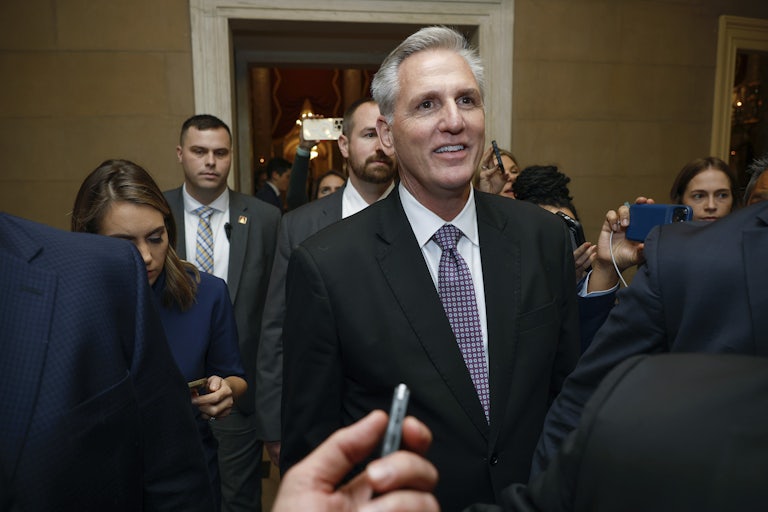
Kevin McCarthy has now gone 0–6 in his attempts to become the speaker of the House, with Wednesday’s three votes being entirely identical. Meanwhile, some right-wingers have been admitting that since the Republican project doesn’t stand for much, other than putting their thumbs down, they could realistically pick anyone for the job.
Indeed, Republicans, who spend their days decrying Democrats as radicals who will not compromise or “work with the other side,” are once again proving that they have no interest in actually governing. That’s the whole point of their project: little government involvement in helping people lead a better life. And they’re finding more avenues to articulate this. “The stakes for the speakership of the House are incredibly low,” Ben Shapiro argued, “because all the leader of the House, basically, has to do is say ‘no’ to most of Joe Biden’s proposals.”
After calling House Speaker's race "funny," Ben Shapiro: "The stakes for the Speakership of the House are incredibly low at this point because all the leader of the House, basically, has to do is say 'no' to most of Joe Biden's proposals" pic.twitter.com/bpKNdfmkj4
— Jason Campbell (@JasonSCampbell) January 4, 2023
Some conservatives are even explicitly arguing that Congress’s inability to pick a speaker and conduct the people’s business is good, because, as Representative Tim Burchett, who backs McCarthy, says happily, “If we’re not doing anything, we’re not doing anything.”
Rep Tim Burchett on House Speaker's race: "If we're not doing anything, we're not doing anything. So maybe this is a good idea that we're not being able to do any work" pic.twitter.com/1iNe50UAgj
— Jason Campbell (@JasonSCampbell) January 4, 2023
And just as some on the right are openly revealing how hollow the conservative project really is, others are admitting how the wheels of Republican politics tend to turn: not by the will of voters but by which way the wind of the most conspiratorial among them blows. Representative Guy Reschenthaler, who has backed McCarthy’s speakership bid, said Tuesday that the Republicans holding out might change their mind once Fox News’s Tucker Carlson and Sean Hannity weigh in. Since then, the stalemate has only grown, and there is no clear end in sight.
As with nearly every drama in Congress, we are reminded once again of the apathetic, cynical conservative project, one that is devoid of any concern with making people’s lives better.

Kevin McCarthy yet again failed to secure the House speaker gavel, after six rounds of voting stretched over two days.
Despite holding a majority in the House, Republicans still can’t coalesce behind McCarthy—or any other candidate for that matter.
McCarthy secured only 201 votes, with Democrat Hakeem Jeffries again securing a plurality of 212 votes. As in the prior two rounds of voting, 20 Republicans voted against McCarthy and for Florida Representative Byron Donalds instead. An additional Republican, Representative Victoria Spartz, voted present for the third time, as a separate form of rebuking McCarthy. Despite the endless hours stuck in the House’s chambers, the dissenters haven’t shown any indication of budging yet.
McCarthy’s loss is especially impressive, given that it means three failures on the same day that former President Donald Trump endorsed his bid for House speaker.
It’s not clear when this floor fight will end, and the House cannot begin governing until there is a speaker. There’s no set deadline, so the drama could be resolved this week or take weeks, or even months, to resolve.
Earlier in the day, Representative Lauren Boebert said former President Donald Trump called the 20 Republicans blocking McCarthy’s bid and told them they “need to knock this off.” No luck, yet.
This post has been updated.

Byron Donalds has become the new preferred House speaker candidate for the Republican bloc opposing Kevin McCarthy’s bid for the gavel. The Florida congressman made waves Tuesday when he defected from McCarthy, voting instead for Representative Jim Jordan on the third vote.
Donalds was nominated for House speaker twice on Wednesday, and secured all 20 Republican votes against McCarthy.
Who is Byron Donalds beyond, as his initial nominator, Representative Chip Roy, said, a “Christian,” a “family man,” and now the second Black man nominated to lead the House?
Donalds, like Democratic leader Hakeem Jeffries, was born and raised in Brooklyn, New York. Having earned degrees in finance and marketing, Donalds worked at various financial and wealth management firms.
As a young man, Donalds had been arrested on a marijuana charge, which was apparently dropped through a pretrial diversion program. A few years later, Donalds pleaded guilty to a felony bribery charge for his role in a plot to defraud a bank—the charge was later expunged. “These were the actions of a young kid, I can’t undo that,” Donalds told a Fox affiliate in 2014.
Donalds first unsuccessfully ran for Florida’s 19th congressional district in 2012. In 2016, he was elected to the Florida state House, going on to win the 19th congressional seat in 2020.
The Florida congressman came into Congress alongside a group of Republicans who called themselves the “Freedom Force,” a counterpart to the Democratic “Squad” that vowed to combat the supposed “evil” of socialism.
Part of this mission apparently entailed lobbying for federal funding for a cobalt plant—one started by an entrenched Republican consultant who once ran the Conservative Leadership PAC and led a firm that netted nearly $1 million from Republican campaigns.
Donalds also enjoyed support from former President Donald Trump in 2020 and 2022. Donalds returned the initial favor, voting to object to the certification of Arizona’s and Pennsylvania’s 2020 presidential election results.
In November, Donalds competed against Representative Elise Stefanik for the role of conference chair, the fourth-highest-ranking position in leadership. Stefanik, who has proudly positioned herself as a Trump supporter, had already endorsed Trump for the 2024 elections; Donalds has not yet done so. Stefanik won the position.
Alliances, just like those in the broader competition for House speaker, are not entirely clear. Trump and many of his allies have stood behind McCarthy. Meanwhile, Donalds and the 19 other Republicans going against McCarthy, who previously echoed how much they love Trump, now say even his support isn’t enough.
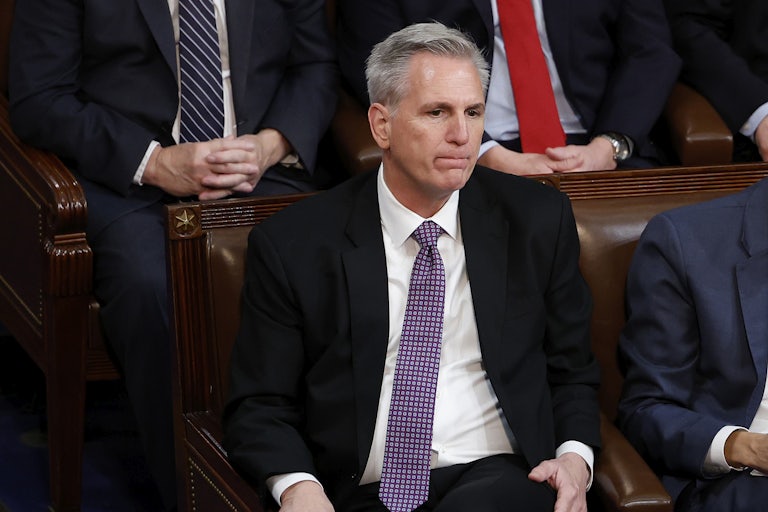
Kevin McCarthy cannot catch a break, losing his fifth consecutive vote for speaker of the House on Wednesday.
The California representative has been open about hoping to seize the gavel, but not only has he repeatedly lost the rounds of voting, he has lost individual votes in the process. In round five, he won just 201 votes out of his party’s 222 seats.
Democratic challenger Hakeem Jeffries again won 212 votes, making him “the lead vote-getter” in each round, as noted by Representative Pete Aguilar, who has officially nominated Jeffries for multiple ballots.
Congress cannot move forward until someone is elected speaker, so the proceedings will continue until someone wins. In Congress’s 200-year history, there have only been 14 instances in which it took more than two ballots to confirm the House speaker. The last one was exactly 100 years ago. It took nine rounds of votes to resolve that battle.
Hopefully it does not take that long this time.
This post has been updated.
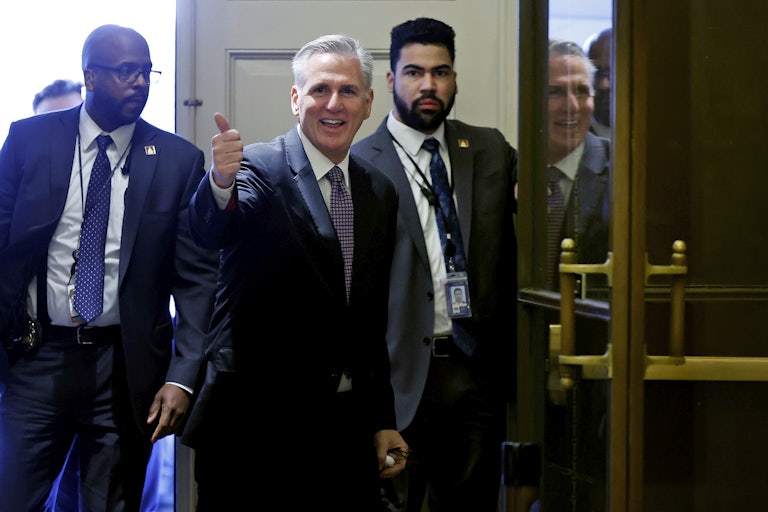
Kevin McCarthy lost a fourth vote Wednesday to become speaker of the House, as the Republican Party struggles to reach a consensus.
The California Republican has made no secret of his desire to be speaker, and confidently predicted he would have the gavel in hand by round two of voting. But he lost three rounds of ballots Tuesday, embarrassingly receiving fewer votes than his Democratic challenger, Hakeem Jeffries, and even losing votes throughout the day, proving that the third time isn’t really the charm after all.
McCarthy won only 201 votes in the first round on Wednesday, even fewer than the day before. Nineteen Republicans have voted against him every time, and their ranks have grown by two. Representative Byron Donalds switched to the “no” camp late Tuesday, and on Wednesday, Representative Victoria Spartz—who previously backed McCarthy—instead voted “present.” Jeffries again received 212 votes, thanks to his party’s unified backing.
Unfortunately for all of us, the shambolic proceedings will continue until someone is elected speaker. Congress cannot move forward until someone wins. The House cannot approve a rules package for the new session or committee leadership. Politico also reported that if the speakership isn’t filled by January 13, committee staffers would have to go without pay.
In Congress’s 200-year history, there have only been 14 instances in which it took more than two ballots to confirm the House speaker. The last one was exactly 100 years ago. It took nine rounds of votes to resolve that battle.
McCarthy has refused to recess between votes to try to whip up more support. While he could still pull off a victory with fewer than 218 votes, it has already become an exhausting slog.
This piece has been updated.
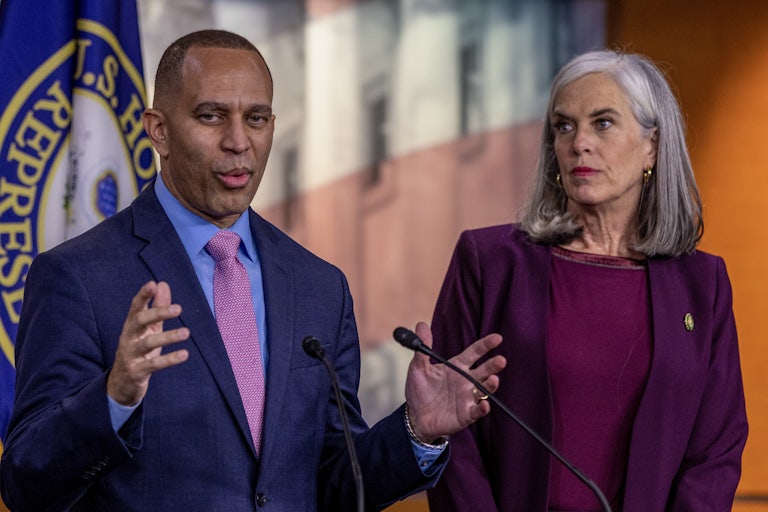
Despite their newfound minority, House Democrats entered the Capitol in relatively good cheer this week, relishing the Republican disarray over who will be the next speaker. While GOP Leader Kevin McCarthy faced several defections in a series of votes for speaker on Tuesday, Democrats were united in their support for Democratic Leader Hakeem Jeffries. With no consensus, the House adjourned in the evening without a speaker—or without actually swearing in any members—ready to pick up where it left off on Wednesday.
While there has been some early speculation about how Democrats might have a role to play in resolving McCarthy’s dilemma, they’ve thus far given no indication that they are ready to offer the would-be House speaker an assist. On Wednesday, Democrats signaled that they would vote against a possible motion to adjourn brought by Republicans, a move that would keep the Republican leader in the hot seat. Jeffries assured me on Wednesday morning that the party would “remain united” and said that he had not spoken to McCarthy about a possible resolution.
“Our colleagues are committed to support Hakeem Jeffries for speaker,” Democratic Caucus Chair Pete Aguilar told reporters on Wednesday, adding that he had not heard from his Republican colleagues.
Democrats were also generally unimpressed with the notion, promoted by moderate Republican Representative Don Bacon, that they could offer some support to McCarthy. “I can’t imagine Democrats voting for somebody who accommodated an insurrection and turned his back on the American people for the speaker of the House of Representatives,” said Democratic Representative Dan Kildee after a Wednesday morning caucus meeting. But he was open to the idea of finding a so-called unity candidate: “If they want to pursue that, they know where to find us.”
“I don’t see Kevin McCarthy being a unity candidate,” agreed Representative Alexandria Ocasio-Cortez. “I do think that if there is any potential of a coalition candidate or, you know, Democrats bailing out Republicans, I think that would have to result in a much deeper and a much more profound negotiation of the structure of the House.” She offered some concessions that Republicans could make to earn Democratic votes on a speaker candidate: Granting committee chairmanships, for example, or agreeing to raise the debt limit, or a combination of multiple sweeteners. “I don’t think that would happen in a couple of hours,” Ocasio-Cortez continued.
Representative Rosa DeLauro also indicated that this was a Republican problem. “I think they have to sort it out,” DeLauro told me, adding that she didn’t think it was “likely” Democrats would take action to help McCarthy. “You don’t come to the floor of the House without the votes to be able to win.”
While Democrats may be popping the proverbial popcorn as this spectacle unfolds for their enjoyment, Kildee stopped short of saying that the new minority was having a good time. “The fact that Republicans are putting their dysfunction on full display has a lot of value. But if I wanted to have fun I’d think of some other things to do,” Kildee said with a laugh.